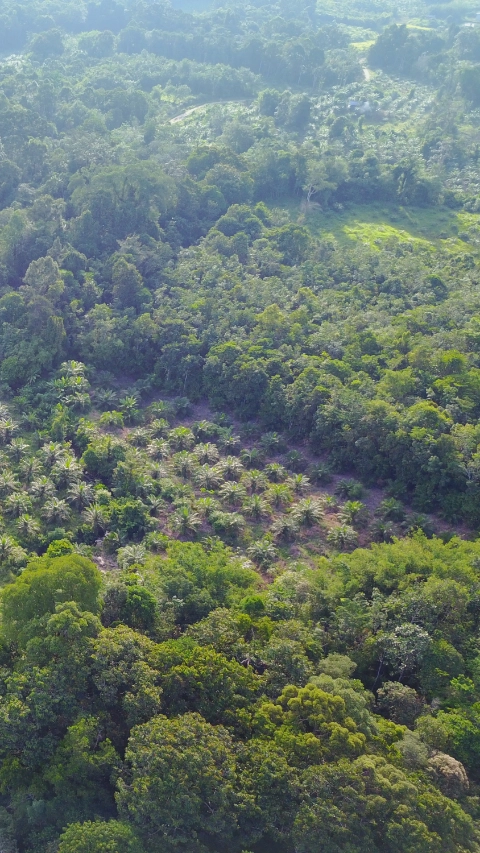Sustainability
Forest Protection
Forests are essential to life on earth. Forests do not only hold the majority of the world’s terrestrial biodiversity but provide crucial ecosystem services as they regulate water cycles, provide clean air and protect the soil from erosion. Through human activity, however, forests are disappearing at alarming rates.
The major causes of deforestation are agricultural expansion and changing dietary preferences of a growing middle class. If deforestation continues at current rates, it will lead to an irreplaceable loss of biodiversity, enhance climate change and will have a negative impact on the livelihood and well-being of people.
BASF recognizes the importance of protecting the world’s forests for the well-being of the environment and society. We focus on our raw materials supply chains, our own operations, as well as our products in the combat against further deforestation. Our approach encompasses primary forests and areas of High Conversation Value (HCV), as well as High Carbon Stock (HCS) forests and peatlands.
Ambition

BASF acknowledges its responsibility as an actor in various value chains and therefore, strives to end deforestation within those. We want to help to achieve the SDG 15 (life on land) and call on governments to end deforestation.
The following principles shape our ambition:
- We support the conservation of HCS forest, HCV areas, peatlands and equivalent ecological and culturally important landscapes connected to the origins of our supply chains.
- No development on HCS forests or HCV areas. Any development activity must utilize international best practice guidance from HCS Approach, from High Conservation Value Resource Network (HCVRN) and from the principles and criteria of the Roundtable on Sustainable Palm Oil (RSPO).
- No development on peatland regardless of depth and strict application of best management practices for existing developments on peat as defined equivalent to the RSPO and no use of fire as a preparation of any area development within our supply chains.
- We do expect any land use change development activity to respect the rights of indigenous and local communities.
- We strive to be a valuable partner for collaboration within our value chains to provide products that reduce pressure on forests for land-use change to agriculture.
Actions - Our Supply Chains
BASF purchases a range of renewable raw materials. The commodities evaluated with high deforestation risks are palm (kernel) oil, soya oil and its derivates, and lignosulphonates extracted from wood. By purchasing volume and equivalent area of land needed to grow the raw material, the most relevant touchpoint for BASF is palm (kernel) oil in comparison to other renewable raw materials, for which the detailed Palm Commitment has been in effect since 2011 and extended in 2015 and which is put into practice through our Palm Sourcing Policy accordingly. Nevertheless, we will drive the compliance to our ambition and principles in all our renewable value chains.
BASF is committed to:
- Developing and implementing sustainable sourcing strategies and partnering with suppliers to maximize their sustainability performance according to our ambition
- Striving for appropriate public transparency and traceability in our supply chains.
- Supporting relevant certification schemes
Actions - Our Operations
BASF operates production sites in more than 90 countries in a way that respects the natural resources. BASF is committed to:
- Operating its facilities in a responsible manner, protecting the environment including forests by reducing emissions to air, water and soil and by producing less waste.
- Systematically evaluate sustainability topics (e.g. potential impact on forests, biodiversity criteria) as an integral part of investment decisions on the construction of new sites and the expansion of existing sites. These may include compensation measures for the loss of forests, e.g. investments in local reforestation programs.
The protection of forests from negative impacts of our operations, if applicable, is always an effort in cooperation with local partners and competent authorities.
Actions - Our Products
The agricultural sector is one of the main drivers of deforestation and therefore in many regions farmers play an important role in the protection of forests. BASF provides many solutions for agriculture, including crop protection, nitrogen management, digital solutions, seeds and pest control. Our innovative solutions and services, e.g. with AgBalance®, enable the sustainable intensification of agriculture by increasing productivity on existing land by mitigating impacts on the environment, locally and globally, wherever and to the extent possible. We thus actively contribute to decreasing the pressure to convert forests into arable land. We also provide plant protection technologies for managed forests to increase their productivity.
Apart from that, livestock is fundamental to meeting the growing demand for products of animal origin like meat, eggs and milk. However, industrialized livestock farming substantially contributes to deforestation. BASF offers a range of animal nutrition products (enzymes, vitamins, glycinates, organic acids) which make livestock farming more sustainable in particular by reducing the feed conversion rate and thereby improve nutrient and energy utilization from feed. To analyze the life cycle impacts of user-defined diets and to provide transparency on environmental impacts along the animal protein value chain, BASF offers the AgBalance® Livestock solution. By enabling sustainable intensification of livestock production, we contribute to reducing the pressure to convert forests into arable land or pastures.
BASF is committed to:
- Conducting research to provide (animal) farmers with the best technologies for farming.
- Supporting (animal) farmers with digital tools, as well as advice on which agricultural practices foster biodiversity and soil health.
- Partnering with certification schemes for agricultural commodities to contribute to a sustainable agriculture that avoids deforestation for more croplands.
Stakeholder Engagement & Reporting
Continuous stakeholder engagement is extremely important to BASF. We will continue to work collaboratively with value chain partners, governments and civil society to conserve forests and to drive our ambition. BASF partners with a variety of organizations, including Roundtable on Sustainable Palm Oil (RSPO), Forum Nachhaltiges Palmöl, Brazilian Coalition on Climate, Forests and Agriculture and the High Carbon Stock Approach Steering Group. We are looking to partner with additional relevant stakeholder groups and organizations to raise and increase awareness, drive the necessary market transformation and to achieve impact on the ground.
Collaborative programs such as Mata Viva, an initiative established in Brazil to drive reforestation and preserve native forests demonstrate BASFs commitment to preventing deforestation and promoting reforestation.
We will continuously report publicly on our progress.






